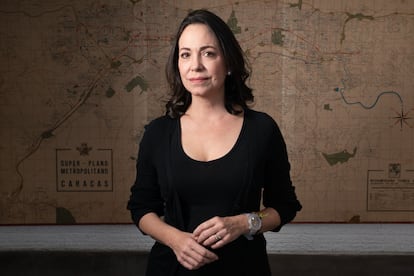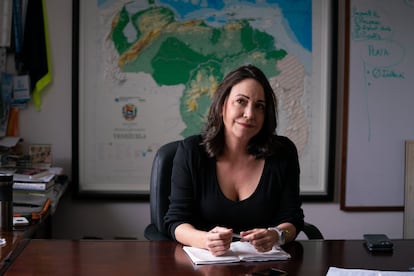What is in store for María Corina Machado, the ‘iron lady’ of the Venezuelan opposition?
The politician, from the most radical wing of her country’s right, is leading the polls for the upcoming primaries

María Corina Machado had not been part of the Venezuelan opposition’s strategy for some time. The politician, from the most radical wing of the right, had become one of the most critical voices against the actions taken by the democratic forces in recent years; now, that position could prove beneficial for her. The current crisis of the opposition – more adrift than ever after the end of the so-called interim government in December – has placed Machado at the head of the polls for the primaries that will be held in October, a key exercise from which the candidate who will face Nicolás Maduro in the 2024 presidential elections will emerge.
In recent times, the founder of the Vente Venezuela (Come Venezuela) party has been the most visible actor of the most inflexible sector of anti-Chavismo. She has refused to enter into political negotiations with the Bolivarian leadership; she has not wanted to formalize alliances with specific sectors of the opposition, arguing ethical reservations; and she has adhered to an uncompromising discourse in defense of private property. She usually calls members of the official political class “criminals” and seems convinced that it will be impossible to achieve a return to democratic legality without resorting to force at some point.
Chavismo, as is to be expected, hates her with particular animosity (it has filed several legal proceedings against her and imposed a ban on her leaving the country), although Nicolás Maduro has chosen to ignore her these last few years. For the rank-and-file Chavista militant, Machado is the ambassador of US interests and the upper classes. She has also accumulated antagonisms among the softer sectors of the opposition, most of them open to negotiate some demands with Maduro in exchange for certain improvements and stability. However, a long-term coherent discourse has now earned the sympathy of many.
María Corina Machado is an industrial engineer with a specialization in finance from the Institute of Advanced Studies of Administration (IESA), the most important business school in the country. The eldest of four sisters, she is divorced and has three children who live abroad, as well as a sentimental relationship with a lawyer called Gerardo Fernández. Her family has a long local lineage: her father, Henrique Machado Zuloaga (who passed away recently), was an important businessman in the metallurgical sector, and her family was the founder of the electric utility Electricidad de Caracas, one of the great national capital corporations of the 20th century. The Machado family businesses – particularly the Sivensa and Sidetur steel companies – have been expropriated and destroyed by the Chavista administration. Her mother, Corina Parisca, a well-known and appreciated member of civil society, is a psychologist.

The openly anti-communist discourse that Machado has methodically cultivated has helped her garner many followers from the Venezuelan diaspora. On social media, her views are defended by the unrestrained expressions of the national right (the so-called “MAGAzuelans”). In 2012 she founded the Vente Venezuela party and tried to give it programmatic foundations: market economy, minimal state, social guarantees, privatization and business leadership, with a nationalist discourse that is deeply rooted in the country’s traditional upper classes.
Sometimes characterized as the expression of “the Venezuelan far right,” Machado’s discourse has no religious bias, it does not foster prejudice nor does it stigmatize minorities or raise conservative arguments in the social field – even if some of her followers do. “She doesn’t really like being contradicted,” says a source that was close to her. “She has a lot of magnetism and personal charm in conversation. She is very disciplined and demanding, but respectful. She is surrounded by a group of activists who greatly admire her, young leaders who have consumed her ideas whole.”
In recent times, her elegant clothes have given way to an almost permanent outfit composed of jeans, sneakers and a T-shirt with her party’s logo, which she wears to visit poor villages and neighborhoods. A wide smile appears regularly during her private conversations, but behind her polite manners lays the iron core of a person with a very strong personality, rigid in her interpretations, with a predestined vision of herself, who favors personal value as an attribute. A person who has a hard time yielding and negotiating.
Machado’s relationships with most of the important leaders of the current Venezuelan opposition are deteriorated. Her critics accuse her of entangling the unitary agreements by making proposals that are impossible to execute and of undermining popular confidence in the voting process for her own benefit. In 2010, she was elected as a member of the National Assembly of Venezuela by a high margin of votes.
In 2004 she founded Súmate (Join Up), an NGO that marked her entry into public life and which became well-known for its link to the opposition and its controlling position in the early years of Hugo Chávez. Historian and prominent intellectual Germán Carrera Damas has been one of her mentors for a long time; she also listens to the advice of economist and opposition politician Carlos Blanco, who was a minister in the 1990s.
“From very early on, she was clear about what the true face of the Chavista regime is, as it became evident later, in the 2017 crisis. We must recognize that,” says a well-known financial analyst who is now her sympathizer. “We tended to see her as someone who sabotaged the unity of the opposition. But no. She knew what some opposition politicians were up to, the deals with the Chavismo, the corruption. She didn’t approve. That’s a point in her favor.”
Sign up for our weekly newsletter to get more English-language news coverage from EL PAÍS USA Edition
Tu suscripción se está usando en otro dispositivo
¿Quieres añadir otro usuario a tu suscripción?
Si continúas leyendo en este dispositivo, no se podrá leer en el otro.
FlechaTu suscripción se está usando en otro dispositivo y solo puedes acceder a EL PAÍS desde un dispositivo a la vez.
Si quieres compartir tu cuenta, cambia tu suscripción a la modalidad Premium, así podrás añadir otro usuario. Cada uno accederá con su propia cuenta de email, lo que os permitirá personalizar vuestra experiencia en EL PAÍS.
¿Tienes una suscripción de empresa? Accede aquí para contratar más cuentas.
En el caso de no saber quién está usando tu cuenta, te recomendamos cambiar tu contraseña aquí.
Si decides continuar compartiendo tu cuenta, este mensaje se mostrará en tu dispositivo y en el de la otra persona que está usando tu cuenta de forma indefinida, afectando a tu experiencia de lectura. Puedes consultar aquí los términos y condiciones de la suscripción digital.








































